

The top 30 cm of soil – the humus layer – stores more carbon than all the world’s trees combined. More than twice as much as the entire atmosphere. Within this thin, living layer lies the greatest natural potential for carbon sequestration – right beneath our feet. Protecting and rebuilding humus is therefore one of the most effective climate actions we can take.
Source: IPCC 2019; FAO 2017; UNEP 2017
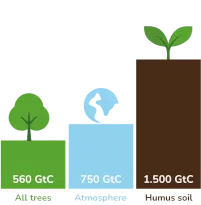
Source: IPCC AR6, FAO Soil Organic Carbon Reports, UNEP
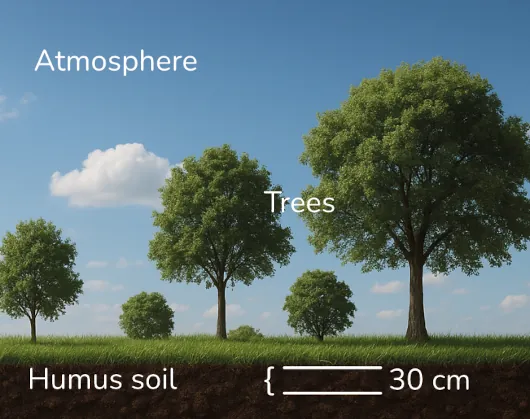
Carbon sink: atmosphere, trees, and humus layer
Decades of over-fertilization, pesticides, poor irrigation, and intensive tillage are destroying humus soils. This means not only the loss of fertile harvests, but also of biodiversity – and of a natural climate protector.
Source: FAO 2015, IPBES 2018.
What do these numbers mean for us?
The consequences are declining harvests, rising food prices, and growing hunger. We are losing not only arable land, but also habitats, biodiversity, and one of the Earth’s most important carbon sinks. More CO2 escapes into the atmosphere, further accelerating climate change. Conflicts over food and water intensify. More people are forced to leave their homes. Refugee movements will reach significant dimensions worldwide.
But this foundation of life is disappearing at a rapid pace.
Soil destruction – an invisible catastrophe.

Agriculture is by far the largest consumer of freshwater worldwide – already using around 70% of available resources. In water-scarce regions such as India, North Africa, or Ethiopia, the figure rises to as much as 85%.
This makes agriculture the epicenter of the global water crisis: unless we change course urgently, food security, biodiversity, and the very survival of many regions are at risk.
Quelle: FAO (Food and Agriculture Organization of the United Nations), „The State of the World’s Land and Water Resources for Food and Agriculture“, 2021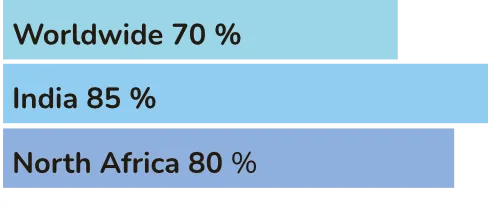
Only living soils can secure our future. Our soil monitoring device helps to detect early when soils fall out of balance, enabling natural processes to be supported. At the same time, it measures soil moisture so that irrigation can be precisely adapted to the plants – saving valuable water.
This allows farmers to cultivate their fields sustainably, strengthen biodiversity, and counteract the impacts of climate change – in harmony with nature, not against it.
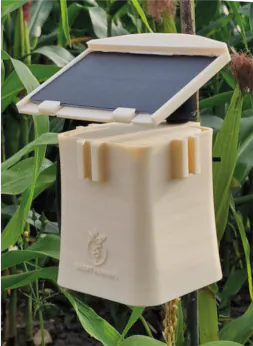
Our soil monitoring device
Device Construction plans, circuit diagrams, and software are freely available for replication.
Smart Farming gGmbH is a non-profit organization.
More and more people feel that we cannot go on like this. That we can no longer exploit the soil, from which all life originates.
But the answer does not lie in new genetic engineering, nor in even more technology. We cannot solve problems with the same tools that created them. Smart machines or AI alone will not save agriculture.
True innovation does not arise from optimizing the old, but from a completely different way of seeing and approaching things.
The old worldview is driven by profit and exploitation of the soil: monocultures, synthetic fertilizers, pesticides, ever higher yields – without giving back what we take. The result: depleted soils, declining biodiversity, and climate change. This has brought the Earth to the brink of catastrophe.
The new worldview recognizes that soils are alive with processes: they build humus, store water, create nutrient cycles carried by billions of soil organisms. If we support these processes, we keep soils healthy and fertile – for ourselves and for generations to come.
Our soil monitoring device makes visible what happens underground and helps us act in time, so that we work with nature, not against it – and learn from it together. It is a tool for observing, listening, and understanding. It is not meant to manipulate nature, but to give it a voice.
This device is the result of a simple idea: we can only protect what we understand.
It regularly measures key soil parameters – moisture, nutrient levels, pH, and temperature – exactly where they matter: at root depth, directly in the field. Small, yet robust. Energy-autonomous through solar power and a supercapacitor. Flexible and expandable through modular connections and open interfaces.
Designed equally for smallholder farmers, research institutions, and educational projects. Usable worldwide – and open to local adaptations and further developments.
A tool to observe and understand the soil – so that we can create opportunities from which the intelligence of nature chooses its path.
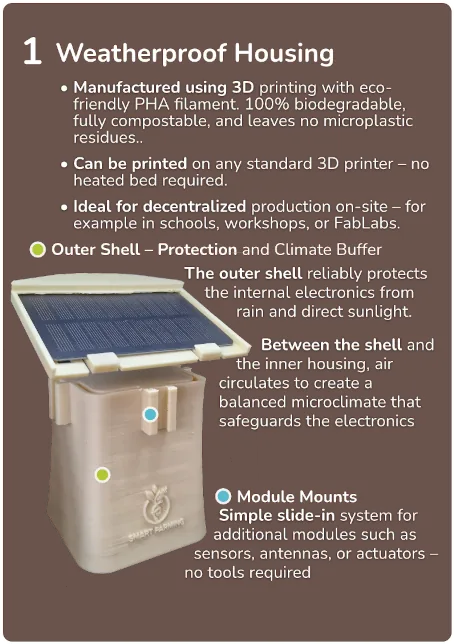
Soil monitoring device with solar cell
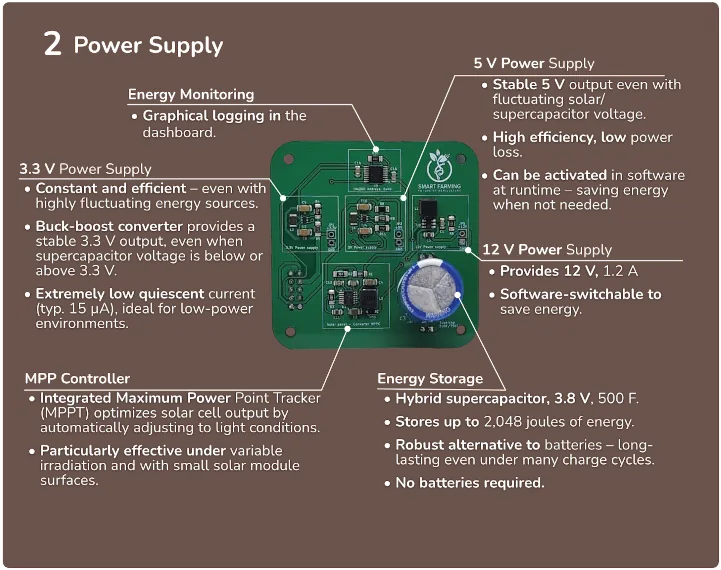
Circuit board with power supply for the Soil Monitoring Device
Sustainable – powered by renewable energy (solar & supercapacitor), with no battery waste.
Robust – withstands heat, humidity, and mechanical stress.
Autonomous – self-sufficient in energy, independent of power grids or complex maintenance.
Durable – designed for many years of operation with minimal wear and tear.
Open & adaptable – open-source hardware and software, easily expandable for new sensors.
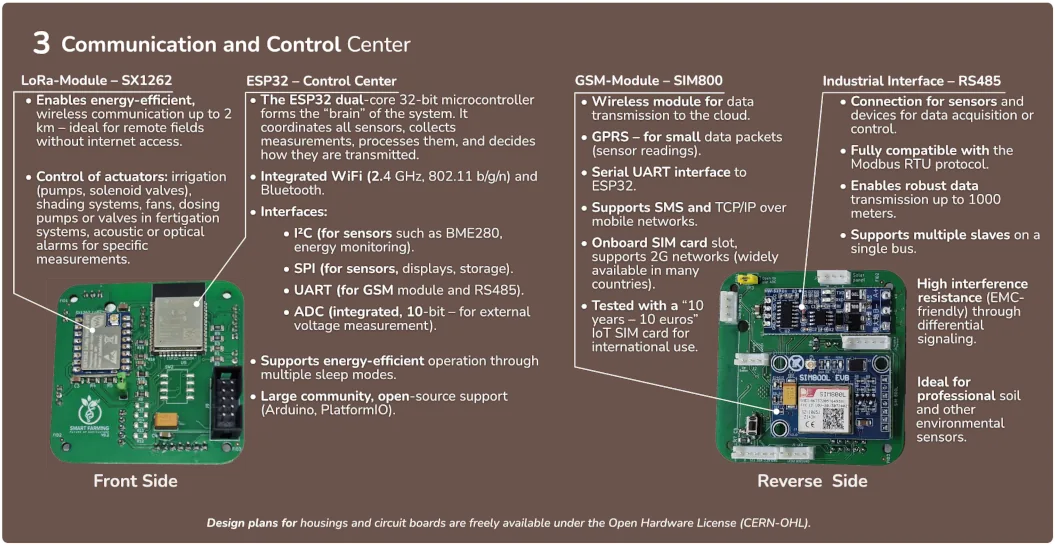
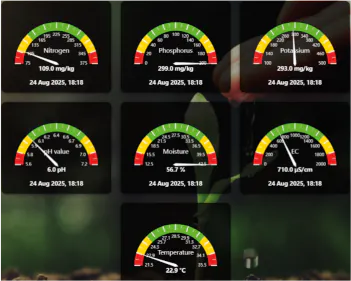
Current Measurements – Nutrients at a Glance
Displays for nitrogen, phosphorus, potassium, pH, moisture, electrical conductivity, and temperature. Simple gauges immediately show current and critical values.
Understanding the Soil – in Real Time. The dashboard translates the language of the soil into clear, accessible indicators. Instead of abstract numbers, farmers see at once what is happening in their fields – whether nutrients are lacking, the soil is drying out, or temperatures are shifting. In this way, the soil monitoring device supports resilient agriculture.
Resilience does not mean resisting a changing environment, but adapting to it. Agriculture is resilient when it can respond to droughts or heavy rainfall without further exhausting the soil. It is about understanding the language of the soil and working with natural processes, not against them.
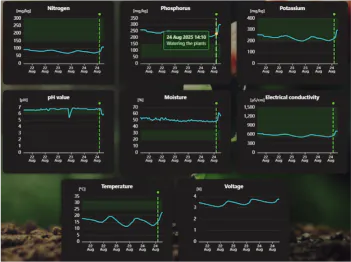
Line charts make developments visible over time. Farmers can take action early – using water more efficiently, maintaining soil fertility, and farming in balance with natural cycles. When nutrients are missing, they can be replenished through compost, manure, or cover crops – instead of burdening the soil with chemicals.
All measurements are stored in a database, individually assigned to each farmer. Beyond that, a shared knowledge system emerges, where the observations of many smallholders come together. This system grows with every measurement and every entry – becoming a guide by farmers, for farmers.
It does not provide recipes for manipulating nature, but rather guidance on how to better understand natural processes and work with them. In this way, everyone benefits: farmers through concrete support, soils through better care, and the climate through the protection of the humus layer.
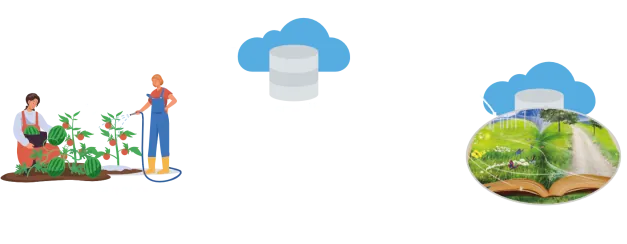
Open knowledge – shared by all, for the benefit of all
The collected measurements flow into an open knowledge database. There they are analyzed and returned to smallholder farmers as concrete recommendations – for better decisions directly in the field.
What matters most is that this knowledge does not remain behind closed doors, but is made available to all farmers on a freely accessible platform. In this way, not only individual farmers but entire communities benefit from shared experiences and insights.
The true strength of the soil monitoring device unfolds when it becomes part of a shared commons – open technology, freely available knowledge, and local adaptation. By sharing designs, data, and experiences, communities can build on each other’s work, scale the impact, and create solutions that serve farmers everywhere.
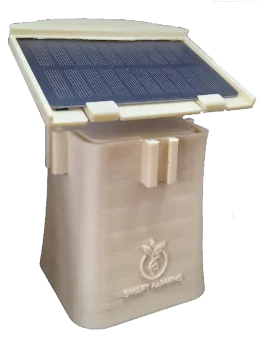
The device is not produced in central factories, but right where it is needed – directly on site. In this way, knowledge and skills remain in the hands of local people, creating independence instead of dependence.
Commons means a shared good – freely accessible, supported and maintained by many. This is exactly how the soil monitoring device is understood: open, decentralized, and replicable.
A single soil monitoring device will not change the world. But its strength lies in its replicability and openness: every farmer, every community, every NGO can build, adapt, and further develop the device themselves.
To ensure the idea can spread without barriers, all design files and software are released under open licenses:
This means: anyone may replicate, improve, and share the soil monitoring device – as long as the results remain freely accessible in turn.
In this way, no dependencies arise, but rather a commons of knowledge and tools.
With every replicated device, the impact grows:
Scaling does not happen through central production, but through sharing, replication, and collective learning.
Industrial agriculture today is one of the main drivers of soil degradation and biodiversity loss – primarily through monocultures, pesticides, and massive land consumption. According to UN reports, it also contributes significantly to global greenhouse gas emissions.
Smallholder farmers, on the other hand, often cultivate their land for generations with methods deeply rooted in local ecology. Within their knowledge lies the intelligence of nature – something no technology can replace. If they are overlooked, we lose centuries of invaluable experience essential for maintaining soil fertility and biodiversity.
At the same time, smallholder farming holds enormous potential: worldwide, despite difficult conditions, smallholders produce around 70% of our food. If they can recognize early when soils fall out of balance, they can respond with simple means – protecting fertility, biodiversity, and the climate.
This is where our soil monitoring device comes in: as a tool to understand the soil and to work with the intelligence of nature.
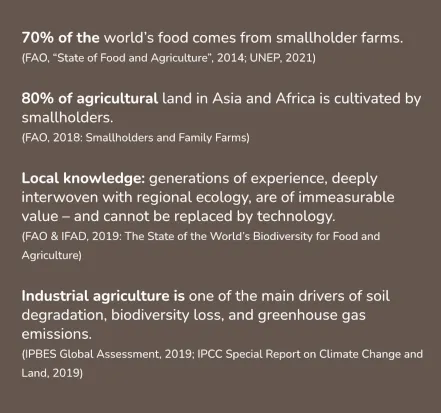
Fact Box: Industrial vs. Smallholder Farming
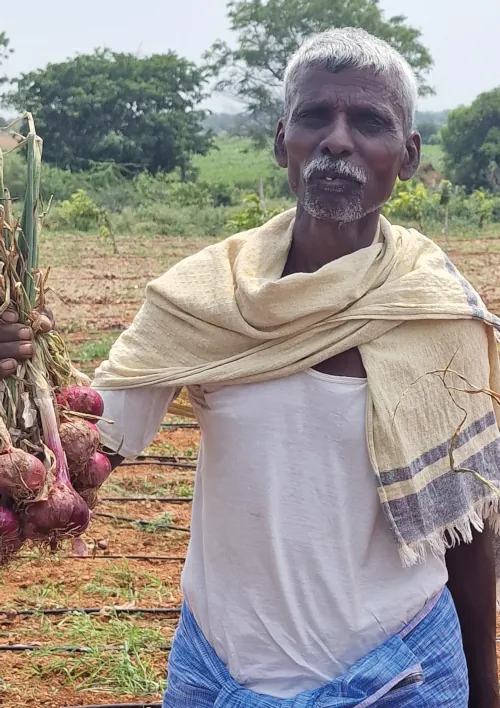
Photo: Achim Giebler, Indien - Odisha, Okt. 2023
Your donation directly supports the implementation of our projects – from the development of the soil monitoring device to the training and support of smallholder farmers on the ground.
This farmer in India represents the people at the heart of our mission: smallholders who secure our food supply.
Soil and water are the key elements of agriculture – they are essential for food, biodiversity, and the climate. The future of our children and grandchildren depends on them.
Our soil monitoring device is a small tool in this great transformation – helping us to better understand soil and water, and thus preserve what our shared future depends on. It is freely available, because we believe that knowledge and tools should belong to everyone – not just a few.
Donations to Smart Farming gGmbH are tax-deductible.
Direct Bank Transfer
If you prefer to transfer funds directly, you can transfer your donation to the following account.
Bank: EthikBank (Germany)
Account holder: Smart Farming gGmbH
IBAN: DE63 8309 4495 0003 5359 75
BIC: GENODEF1ETK
Reference: Donation Smart Farming
All donations are tax-deductible. A donation receipt can be issued upon request.
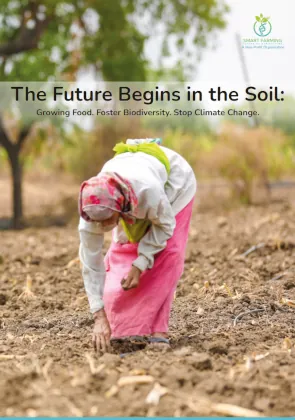
Soil Monitoring Device Brochure
Download Brochure (PDF)